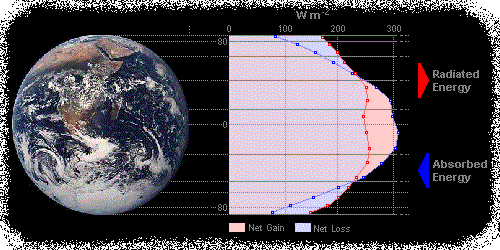
Climate change is a difficult subject to study because, while in the short-term climate appears to be stable, climate seems to be subject to several overlapping cycles ranging from the decades of the sunspot cycle, to many thousands of years. Even in the past five hundred years, the British Isles have experienced very warm periods, and cold period with winters so cold that major rivers such as the Thames have frozen over.
For much of mankind's short tenure of a million or two years tenure on the earth, our impact on the planet has been negligable. It was during the supremacy of the Romans that the lands of North Africa bordering the Mediterannean which formed Rome's "bread basket" were exhausted. It was not, however, until the start of the industrial revolution that mankind has had a serious impact on climate by pumping out ever-incresing amounts of greenhouse gasses, particularly carbon dioxide into the atmosphere which has been trapped in the earth for millions of years as fossil fuels.
While the earth is undoubtedly experiencing the accelerated effects of climate change the decades of debate as to whether the changes are anthropogenic (caused by human activity) or evolutionary and part of the natural cycles continue and show every sign of continuing for a long time to come. Despite the debate, it is now almost universally accepted that it is the recent human activities which have released vast quantities of greenhouse gasses into the atmosphere are contributing to the present trend of global warming and the debate is concentrated on the degree rather than the fact.
|
Human activities are also recognised as producing other important effects such as the depletion of the ozone layer which protects life on the planet from harmful ultraviolet raditation from the sun.
|
The impacts of climate change are wide ranging and present many challenges but also opportunities. A common misconception is that as the world warms, the effects will be just a gradual warming of the climate. This may not necessarily be the case. Melting of glaciers and what was formerly permanent snow is bound to affect low-lying communities and storms and unusual weather phenomena may become more frequent and more violent.
The UK Climate Impact Programme (UKCIP) has reported mounting evidence at both national and local levels of climate change which has already taken place in the British Isles including the increase of the thermal growing season by a month in central England during the course of the 20th century, heatwaves have become more frequnet with a corresponding decrease in frosts and cold spells and an avarage rise in sea level around the United Kingdom of about 10 cm (4 inches) during the 20th century.
| Climate Change Consequences |
The climate change and rising sea levels brought about by global warming will have profound consequences in the long term. The changes will affect the environment, society and have a considerable economic impact.
Sea level rise will not only affect coastal and estuarine communites but those further inland who will have to share the huge costs of improved defences and possible abandonment of some communities. Already there is a world-wide trend recognising that coastal erosion is a natural process and cannot be staved off indefinately, invariably at great public expense. This manifests itself in the UK particularly along the east coast of England.
The changes will also bring positive effects although the overall situation is difficult to predict as various effects could override each other. Hotter and drier conditions in the South West may lead to a further growth of tourism in the region but this would increase environmental pressures and make greater demand on water resources.
Increasing frequency of storms and wet weather will cause flooding and destruction but the generally milder climate may have benefits for health and be accompanied by a lower demand for energy for space heating.
| Northward Species Migration |
As the climate has warmed and become warmer northwards, the northern limits of the ranges of many species restricted to the south have also steadily migrated northwards. Conversely, the southern limits of the ranges of species restricted to the colder north of the British Isles have receded northwards before the warmer climate.
This trend has also been recorded in the marine environment in the first sightings of many species from warmer waters, not previously recorded off our shores;
Flying Gurnard (Dactyloptena orientalis, 1980);
Blue Marlin (Makaira nigricans, 1982);
Sharp-Nosed or Seven-Gilled Shark (Scoliodon terrae-novae, 1984);
Big-Eyed Tunny (Thunnus obesus, 1985);
Smooth Pufferfish (Sphoeroides pachygaster, 1987);
Flathead Grey Mullet (Mugil cephalus, 1989);
Short-Beaked Garfish (Belone belone, 1990);
Blue Runner (Caranx crysos, 1993);
Greater Amberjack (Seriola dumerili, 1994);
Red Scorpion-Fish (Scorpaena scrofa, 1995);
Saupe (Sarpa salpa, 1995);
Sailfin Dory (Zenopsis conchifer, 1995);
Black or Small Scaled Scorpion-Fish (Scorpaena porcus, 1998);
Short-Snouted Seahorse (Hippocampus hippocampus, 1998);
Almaco Jack (Seriola rivoliana, 1999);
Saddled Seabream (Oblada melanura, 2000);
Big-Eye Thresher (Alopias superciliosus, 2001) and the
Barracuda (fam. Sphyraenidae, 2001);

The Centre for Climate Change Impact Forecasting (C-CLIF) is based in the South-West
anticipates considerable changes in the regions climate by the middle of the present century;-
| The summer temperatures experienced in 1995 becomming the norm. |
| Summer heatwaves becomming several times more frequent than at present. |
| The thermal growing season becomming extended by between 5 and 20 days. |
| Frost-free winters becomming commonplace with very few winter snowfalls. |
| Wetter and more stormy winters and drier summers prone to drought. |
| Winter precipitation becomming more intense with an increased risk of flooding. |
| Higher storm surges in coastal areas. |
| Annual temperatures higher by 0.8 to 2.3 °C
compared to a warming of only 0.30 °C in the South-West throughout the whole of the 20th century. |
| Total sea-level rises of about 0.2 to 0.8 metres (8 to 31.5 inches). |
1998 and 2001 were the two warmest years since records began in the mid 19th century and the 1990s were the warmest decade on record.
During the last 740,000-or so years there have been eight major ice ages and climatologists believe that, the effects of global warming apart, the next ice age should start in about 1,600 years and last about 16,00 years. Ice Ages have been so common in the earth's recent history that the intervening periods are known as "interglacials".
|
A consortium of scientists from eight nations with the European Project for Ice Coring in Antarctica (EPICA) , led by Eric Wolff of the British Antarctic Survey based in Cambridge, has retrieved an ice core of a record 3km length from a site in East Antrctica known as a site known as "Dome C. The core reveals the secrets of the earth's climate over a time period of some 740,000 in remarkable detail. Not only the ice itself can be studied, but also the small bbubles which formed in it as the snow was compacted into ice, trapping the tiny samples of the atmosphere at the time.
The EPICA team have described the eivdence of eight ice ages which they have discovered in the 3,000-metrte long core and four ice ages have occured in the last 43,000 years. The core seems to suggest that the previous Ice Ages ended in conditions similar to those which prevailed at the end of the last ice age which ended about 12,000 years ago - the inter-glacial period which preceeded the last ice age lasted about 28,000 years.
Based on the evidence of temperature and atmospheric conditions recorded in the ice core which are similar to those prevailing today, the EPICA team estimate that the next ice age would occur in about 16,000 were it not for the human activities which cause global warming caused by the rapid release of large quantities of greenhouse gasses, particularly carbon dioxide and methane.
The greenhouse gasses are produced chiefly by the burning of fossil fuels such as coal and oil and other industrial activities. They reflect light of short wavelengths (heat], which would otherwise be radiated out into space, back towards Earth warming it. Ironically, the warming can set off a chain of atmospheric, oceanic and climatological changes that can trigger a sudden change in climate . . . and possibly trigger the next ice age.
The 2004 Hollywood blockbuster, "The Day After Tomorrow", is about the earth being plunged into a sudden and deadly ice age because of the global warming caused by humanity's release of "greenhouse gases" into the atmosphere.
|

| circa 3600 | | Climatologists believe the next major ice age will start in about 1,600 years and last for 16,000 years | | |
|
| | | Links to Other Pages on this Site
|
| |
| | |
|
| | | Links to Other Sites
|
| |
| | |
In Cornwall, the Cornwall Association of Rainfall Recorders has been measuring daily rainfall in the county since 1940. The accurate measurements, recorded to Met Office standards, are used to produce a monthly tally for each site.
Analyses of the records show a trend of increasing rainfall for Cornwall which has become wetter by about fourty per cent since 1940. Most of the percipitation occurs in the winter months but the summers have also become marginally wetter.
Recommend a Book for this Page
Hits on this page since December 6th| Jan | | | | | Feb | | | | | Mar | | | | | Apr | | | | | May | | | | | Jun | | |  | | Jul | | |  | | Aug | | |  | | Sep | | |  | | Oct | | |  | | Nov | | | | | Dec | | |  |
current year:  | | previous year:  |
No messages posted on this page Only Members of the Site can post messages in this section. Signing in is easy from our Home Page. DISCLAIMER: Whilst we endeavour to ensure the content of this site is correct, we cannot undertake that information you find here, is, or will remain accurate and complete. We do not warrant that any information contained on this site is fit for any purpose. If you wish to place reliance on any such information you must check its accuracy by some other means before doing so. MEMBERS get aditional features on our pages and will soon be able to interact with the site and add their views and informastion. Sign up, from the Home-Page, is simple and involves typing in your email address and a password of your choice. If you are in any way connected with any location or interested in the subject mentioned on this page and have an hour or two a month to spare, we would welcome you as a local moderator - please email the webmaster by CLICKING HERE. Privacy Policy
|
|









